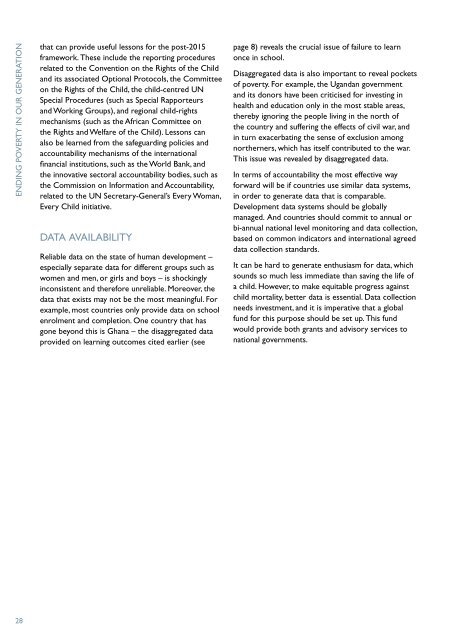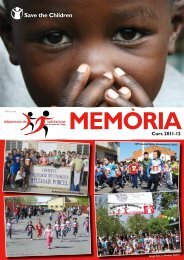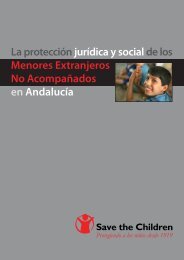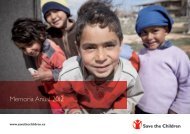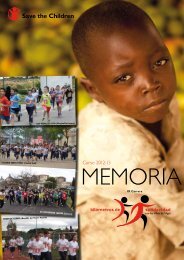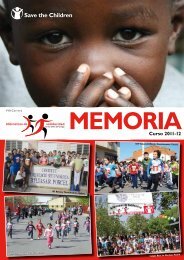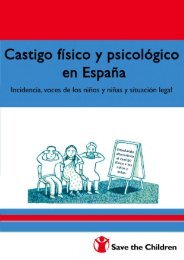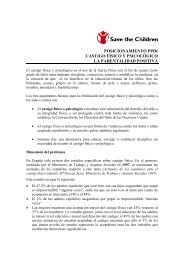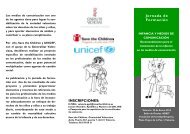ENDING poverty - Save the Children
ENDING poverty - Save the Children
ENDING poverty - Save the Children
You also want an ePaper? Increase the reach of your titles
YUMPU automatically turns print PDFs into web optimized ePapers that Google loves.
<strong>ENDING</strong> POVERTY IN OUR GENERATION<br />
that can provide useful lessons for <strong>the</strong> post-2015<br />
framework. These include <strong>the</strong> reporting procedures<br />
related to <strong>the</strong> Convention on <strong>the</strong> Rights of <strong>the</strong> Child<br />
and its associated Optional Protocols, <strong>the</strong> Committee<br />
on <strong>the</strong> Rights of <strong>the</strong> Child, <strong>the</strong> child-centred UN<br />
Special Procedures (such as Special Rapporteurs<br />
and Working Groups), and regional child-rights<br />
mechanisms (such as <strong>the</strong> African Committee on<br />
<strong>the</strong> Rights and Welfare of <strong>the</strong> Child). Lessons can<br />
also be learned from <strong>the</strong> safeguarding policies and<br />
accountability mechanisms of <strong>the</strong> international<br />
financial institutions, such as <strong>the</strong> World Bank, and<br />
<strong>the</strong> innovative sectoral accountability bodies, such as<br />
<strong>the</strong> Commission on Information and Accountability,<br />
related to <strong>the</strong> UN Secretary-General’s Every Woman,<br />
Every Child initiative.<br />
DATA AVAILABILITY<br />
Reliable data on <strong>the</strong> state of human development –<br />
especially separate data for different groups such as<br />
women and men, or girls and boys – is shockingly<br />
inconsistent and <strong>the</strong>refore unreliable. Moreover, <strong>the</strong><br />
data that exists may not be <strong>the</strong> most meaningful. For<br />
example, most countries only provide data on school<br />
enrolment and completion. One country that has<br />
gone beyond this is Ghana – <strong>the</strong> disaggregated data<br />
provided on learning outcomes cited earlier (see<br />
page 8) reveals <strong>the</strong> crucial issue of failure to learn<br />
once in school.<br />
Disaggregated data is also important to reveal pockets<br />
of <strong>poverty</strong>. For example, <strong>the</strong> Ugandan government<br />
and its donors have been criticised for investing in<br />
health and education only in <strong>the</strong> most stable areas,<br />
<strong>the</strong>reby ignoring <strong>the</strong> people living in <strong>the</strong> north of<br />
<strong>the</strong> country and suffering <strong>the</strong> effects of civil war, and<br />
in turn exacerbating <strong>the</strong> sense of exclusion among<br />
nor<strong>the</strong>rners, which has itself contributed to <strong>the</strong> war.<br />
This issue was revealed by disaggregated data.<br />
In terms of accountability <strong>the</strong> most effective way<br />
forward will be if countries use similar data systems,<br />
in order to generate data that is comparable.<br />
Development data systems should be globally<br />
managed. And countries should commit to annual or<br />
bi-annual national level monitoring and data collection,<br />
based on common indicators and international agreed<br />
data collection standards.<br />
It can be hard to generate enthusiasm for data, which<br />
sounds so much less immediate than saving <strong>the</strong> life of<br />
a child. However, to make equitable progress against<br />
child mortality, better data is essential. Data collection<br />
needs investment, and it is imperative that a global<br />
fund for this purpose should be set up. This fund<br />
would provide both grants and advisory services to<br />
national governments.<br />
28


